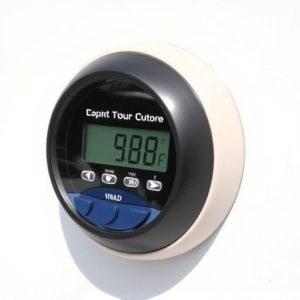Secure Your Inground Pool: A Guide to Swimming Pool Alarms
Swimming pool alarms are critical safety devices for inground pools, offering additional protection …….
Swimming pool alarms are critical safety devices for inground pools, offering additional protection beyond physical barriers and supervision. These alarms detect unauthorized or accidental entries into the pool and send immediate audible or silent alerts, which are essential for preventing drowning, especially when direct oversight is momentarily absent. Selecting the right alarm system that suits the specific dimensions of your pool, aligns with local safety standards, and integrates seamlessly with your home Wi-Fi network for real-time smartphone notifications is important. Optimal models are also designed to be pet immune to prevent false alarms. Installation by professionals who understand inground pool systems ensures the alarm works without disrupting the pool's aesthetics or functionality, and consistent maintenance and testing are required to keep the system sensitive and responsive. Adherence to these practices not only complies with safety regulations but also demonstrates a commitment to safeguarding swimmers in and around your inground pool. Regular inspections and updates ensure that swimming pool alarms for inground pools continue to provide reliable, effective, and timely protection, creating a safer environment for everyone who enjoys your pool.
Swimming in an inground pool offers a respite from the daily grind, but safety remains paramount. This article delves into the critical role of swimming pool alarms for inground pools, guiding pool owners through the selection, installation, and maintenance of these systems to ensure uninterrupted vigilance around the water. From understanding the necessity of such alarms to mastering their testing and monitoring, discover how to enhance safety measures for your inground pool oasis.
Assessing the Necessity of Swimming Pool Alarms for Inground Pools
Swimming pool alarms serve as a critical safety feature for inground pools, offering an additional layer of protection that complements physical barriers and supervision. When evaluating the necessity of installing such an alarm system, one must consider the level of usage the pool receives, the presence of children or vulnerable individuals near or with access to the pool area, and the proximity of the pool to residential living spaces. Inground pool alarms are designed to detect unauthorized or accidental entries into the water, sending audible or silent signals to alert property owners or lifeguards immediately. This rapid response capability is invaluable for preventing potential drowning incidents, especially when direct supervision may be momentarily lapsed. Moreover, these systems can be customized to suit different pool sizes and shapes, ensuring they integrate seamlessly with the inground pool environment. It’s advisable for pool owners to research and select a model that aligns with their specific needs and adheres to local safety regulations. Regular maintenance and testing of the alarm system further guarantee its reliability and effectiveness in safeguarding swimmers.
Types of Pool Alarms Best Suited for Inground Pools
When prioritizing safety around an inground pool, investing in reliable swimming pool alarms is paramount. These alarms serve as a deterrent against unauthorized access and can provide early detection of any falls into the water, potentially saving lives. For inground pools, it’s crucial to select alarms that are designed to integrate seamlessly with their environment. Acoustic or visual alarms that connect to the home Wi-Fi network offer real-time notifications to owners’ smartphones and can be placed strategically around the pool area. Additionally, water surface motion detectors are highly effective for inground pools, as they can sense disturbances on the water’s surface, triggering an alarm if a fall is detected. These devices are often compatible with automated pool systems, ensuring that they do not interfere with pool cleaning robots or other maintenance equipment. When choosing a swimming pool alarm for an inground pool, consider models with pet immune features to prevent false alarms from large animals. The best swimming pool alarms for inground pools combine reliability, ease of installation, and compatibility with existing pool infrastructure to ensure the safety of all swimmers and users.
Installation and Maintenance of Pool Alarms in an Inground Setting
When installing swimming pool alarms for inground pools, it’s crucial to adhere to local regulations and safety standards to ensure optimal protection against unauthorized access. The installation process should be carried out by a qualified professional who understands the intricacies of inground pool systems. These experts can integrate the alarm system seamlessly into the pool’s existing infrastructure, ensuring that the technology is both effective and discreet. Once installed, regular maintenance checks are imperative to guarantee the alarm functions correctly. This involves routine testing of the system to confirm its sensitivity and responsiveness, as well as battery replacement or charging as per the manufacturer’s guidelines. Additionally, the sensor’s cleanliness and proper positioning must be maintained to prevent false triggers or malfunctions. Regular inspection and timely maintenance can extend the life of the pool alarm and provide continuous safety monitoring for your inground pool. Homeowners should establish a schedule for these checks, typically monthly, to safeguard against potential hazards associated with pool usage. By keeping the swimming pool alarms for inground pools in top condition, you not only comply with safety regulations but also create a safer environment for swimmers of all ages.
Ensuring Safety: Testing and Monitoring Pool Alarm Systems with Inground Pools
Swimming pool safety is paramount, especially with the presence of inground pools which often host families and guests for leisure and recreation. To maintain a secure environment around an inground pool, it’s crucial to equip the pool with reliable alarm systems designed specifically for such settings. These alarms serve as a prompt and audible warning system in case of unauthorized access or potential dangers that could pose a risk to swimmers, particularly children or pets.
Homeowners with inground pools should consider investing in swimming pool alarms that are tailored for this context. These devices are designed to detect movement around the perimeter of the pool or changes in water chemistry that could indicate an emergency. Regular testing and maintenance of these systems ensure they function optimally, providing peace of mind. Monitoring these alarms consistently allows for immediate response to any triggered events, reducing the risk of tragic accidents. It’s important to adhere to local regulations and guidelines when installing and maintaining these systems to guarantee compliance and effectiveness. Additionally, integrating pool alarms with a broader home security system can enhance overall safety measures, offering a comprehensive approach to protecting those who use the pool.


